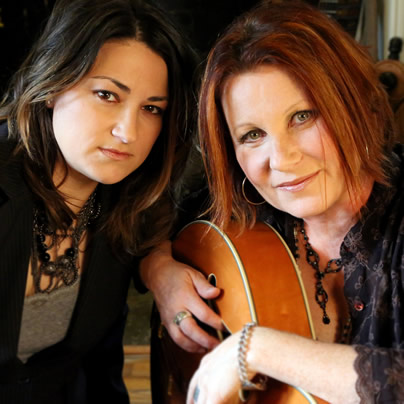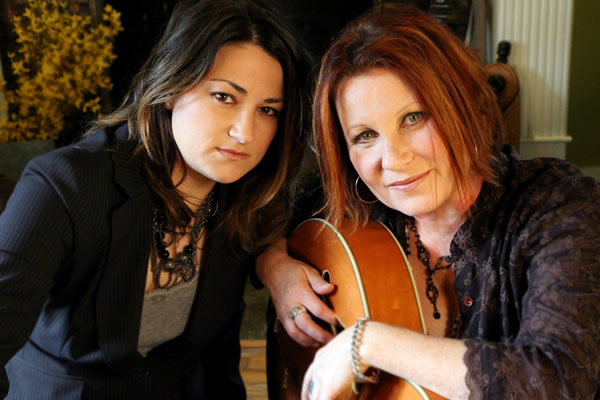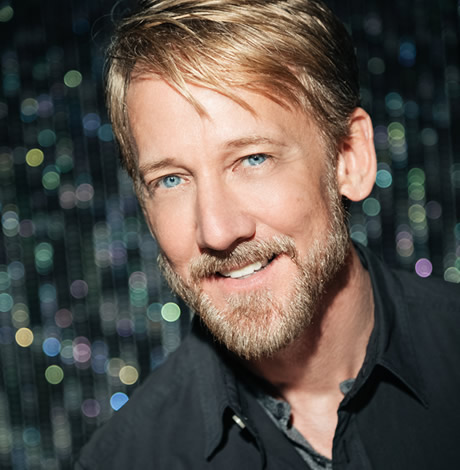Arts & Entertainment
Sisters in spirit
Gospel music vets Knapp, Becker unite for Christmas album, tour

Margaret Becker and Jennifer Knapp
‘The Hymns of Christmas Tour’
Monday, 7:30 p.m.
The Birchmere
3701 Mount Vernon Ave.
Alexandria, VA
$25

Margaret Becker (right) a veteran of gospel music with classic albums like ‘Immigrant’s Daughter’ and ‘Simple House’ in her canon, just finished a Christmas album with Jennifer Knapp, a gospel artist who emerged in the late ’90s. (Photo by Heidi Groff; courtesy Jay Jones Music)
Any touring musician will tell you life on the road — even when you can afford first class all the way — can get to you after years of going through the endless recording/promoting/touring/repeat cycle.
Two gospel music veterans who, at different times and to varying degrees, each spent years out of the limelight, are back with a wildly unexpected joint project — an album called “The Hymns of Christmas.” On it, Margaret Becker and Jennifer Knapp trade leads and harmonies and enjoy what they say is great musical repartee. They’re half-way through a 14-date mini-tour to support it and play the Birchmere in Alexandria, Va., Monday night.
Knapp, 38, released her first major label album to the Christian market in 1998 and worked solidly touring and recording through 2002 at which time she went on a long hiatus, moved to Australia and pretty much gave up any thoughts of continuing her career. She came out as a lesbian in April 2010 and released a comeback album called “Letting Go.” She maintains her Christian faith but says, though she doesn’t claim to be a theologian, she believes many of the scriptures traditionally used to condemn gays have been misunderstood and misinterpreted.
Becker, 53, was practically peerless among Christian music women rockers in her heyday. She released her first album in 1987 and though she recorded plenty of ballads and exhibited tremendous songwriting prowess, Becker always rocked harder than her contemporaries like Amy Grant or Twila Paris. Becker enjoyed a great run throughout the late ‘80s and ‘90s but slowed down tremendously by the ‘00s. Her new effort with Knapp is her first new album since 2007’s “Air.”
During a lunch break last week between back-to-back shows in Canton, Ohio and Indianapolis, Knapp fields a bevy of questions on how she has settled into being an openly gay singer, the collaboration with Becker and how it came about and what fans can expect from their show next week at the Birchmere.
It’s a highly non-glam tour and Knapp makes no attempt to hide it. They’re sharing a van and Becker is in line getting lunch at a Subway while Knapp answers Blade questions. Though the interview is with Knapp, Becker quickly follows up with e-mail inquiries later in the day.
“It’s just gonna be Margaret and I with a couple of acoustic guitars, but don’t let that fool you,” Knapp says. “It’s one of the most fun times I’ve ever had and it’s not gonna be some pared down girly acoustic thing. It’s gonna be a really good, full-voiced night. It shocks me when I look over at her and see how much she gives each night.”
Though not as active as she formerly was, Becker still speaks at religious women’s events and participates in hymn recording projects. Her audience is very much part of the Nashville-based contemporary Christian industry, the ranks of which both she and Knapp came through.
The two met in about 2000 when they both participated in a pair of multiple-artist projects and became friends. Knapp, who long has admired Becker, says it took no arm-twisting to convince Becker to record and tour with her, though many gospel fans turned their back on Knapp.
“Fortunately it’s not really an issue we’ve had,” Knapp says. “Tonight’s going to be a prime example. We’re playing at a United Methodist church in Indianapolis. It will be a lovely Christmas evening and the last thing we’ll be talking about is our sexual orientation. It’s a huge step for that church to host somebody like me and just proceed as if it’s business as usual but I think we’re seeing that more and more in terms of the public consciousness. I think we saw that in this last election. It’s great that people can take that and not draw this unusual amount of attention to it. That’s really the extraordinary part of it.”
Becker, in an e-mail exchange, says she’s not finding fans and those coming to the shows to be inferring anything about her life or ministry by her collaboration with Knapp.
“The audiences who are supporting this are music lovers who recognize when the work is symbiotic and complementary,” Becker says. “We’ve played this tour to those people, groups that I consider to be overlapping supporters from both of our bases. They are respectful and come for the music and spirit or the art of the material. I don’t think they give it much more thought than that and to me, that’s perfect. That’s how it should be.”
For the record, Becker declines to comment on her own sexual orientation. “My personal life is private and I’m very happy,” she wrote in an e-mail via her publicist. “I am very supportive of Jennifer and this musical partnership we’ve created and look forward to sharing it with her supporters and mine.”
The album features mostly acoustic arrangements of traditional church classes like “Hark the Herald Angels Sing,” “The First Noel,” “What Child is This,” “Silent Night” and more. Neither artist had recorded a Christmas album before and now that both are again living in the Nashville area, they decided this summer to go ahead and make it happen.
“We finally said, ‘Let’s just do it, let’s just get it done,’” Knapp says. “There was no pressure to write anything new, they’re all hymns so there’s a great wealth of material there and lots of opportunities for us to harmonize. We just decided to put our money where our mouth was and go ahead and do it.”
Becker concurs.
“One night we just got serious and realized we’d both put off making a Christmas record over the course of our careers, at least the kind that was indigenous to us. That’s where the idea came from. Making music with a dear friend who is also an awesome talent was the catalyst for me. It was fun top to bottom.”
The indie album was recorded on a shoestring with, Knapp says, basically “one mic and one computer.” She says the advance of user-friendly recording software made it possible to do the album without spending thousands. They did some spring rehearsing, hit the studio in July (when most Christmas albums are recorded) and did most of the work in a four-week span. The mixing and packaging came soon after and the project wrapped in October.
“It did feel a little weird at first singing all these Christmas songs while you’re just dripping in sweat in the middle of the hot Tennessee summer,” she says. “So at the beginning, yeah, it took a little time to wrap my head around a Christmas project but pretty quickly it really did start to feel like its own project. It didn’t feel kitschy or Christmasy really to me. We approached it in a very honest sense and didn’t want to make it kitschy. Maybe it’s just because I was involved with it but I really was thinking, ‘Wow, I could listen to this any time of the year.’”
The first half of the show is basically the new album. In the second half, the two revisit their hits, trade harmonies on each other’s songs and keep it loose enough that the set list varies from show to show.
“We’ve sort of got this telepathy thing going on for the last two or three shows,” Knapp says. “We’ll just kind of riff on a theme for a bit and it’s great knowing you don’t have to play it exactly the same way every night or carry the full weight of the evening by yourself.”
Knapp ends the conversation weighing in on a blaze of topics. On whether or not Christians in the U.S. are becoming less rigid on homosexuality, Knapp says there “will always be people who aren’t going to change their minds no matter what.” She says she finds encouragement in the Mainline Protestant denominations that are making gay-friendly strides more and more as time progresses.
Why then, one wonders, have those kinds of churches not spawned their own cottage industry of gospel music the way the evangelical/Bible Belt world did starting with “Jesus music” in the late ‘60s?
“It’s a question I’ve been asking myself for years,” Knapp says. “There are thousands of singers who write about their faith from very different viewpoints but I really think a lot of it has to do with the circumstances in that world where the people who run the industry really see themselves as the gatekeepers and a great emphasis is placed on how the individual artist acts and who they hang out with and how you think about your faith. We’ve seen a lot of strong artists pulled from shelves because they’ve gotten divorced or had an alcohol problem or whatever. As a songwriter you really have to keep writing true and honest stories. If you’re only writing music for Christians, by Christians to make more Christians, you kind of lose out.”
Lee Tucker, a long-time gay gospel music fan and Alexandria, Va., resident, says Knapp deserves enormous credit for being brave enough to come out, despite what it might cost her in lost airplay, space at Christian retail and fans.
“I think it’s amazing she took the brave jump to come out,” Tucker says. “It was a big jump for Chely Wright too because a lot of country music is in the Midwest and in the Bible Belt, but it’s even more of a leap for Jennifer because it will totally change her market. If you went into a Christian bookstore right now, you wouldn’t find any of her stuff on the shelves at all.”
For LGBT teens who might be coming up in evangelical households, Knapp says hang in there and remember there are faith-based Christian groups out there that affirm gays.
“Absolutely get online, there are so many people out there waiting with open arms,” she says. “The Christian Network, Believe Out Loud, Soulforce, Inside Out Faith — there are a lot of people out there offering very compassionate, faith-based support. It’s not longer just churches being the bad guys here. A lot of them are starting to get the message.”

Team DC, the umbrella organization for LGBTQ-friendly sports teams and leagues in the D.C. area, held its annual Night of Champions Awards Gala on Saturday, April 20 at the Hilton National Mall. The organization gave out scholarships to area LGBTQ student athletes as well as awards to the Different Drummers, Kelly Laczko of Duplex Diner, Stacy Smith of the Edmund Burke School, Bryan Frank of Triout, JC Adams of DCG Basketball and the DC Gay Flag Football League.
(Washington Blade photos by Michael Key)




















The 2024 National Cannabis Festival was held at the Fields at RFK Stadium on April 19-20.
(Washington Blade photos by Michael Key)
















Covering the @NatlCannaFest at RFK Stadium for @WashBlade . Stop by the LGBTQ+ booth and pick up a paper if you are here. pic.twitter.com/is7hnsaPns
— Michael Patrick Key (@MichaelKeyWB) April 20, 2024
Theater
‘Amm(i)gone’ explores family, queerness, and faith
A ‘fully autobiographical’ work from out artist Adil Mansoor

‘Amm(i)gone’
Thorough May 12
Woolly Mammoth Theatre
641 D St., N.W.
$60-$70
Woollymammoth.net
“Fully and utterly autobiographical.” That’s how Adil Mansoor describes “Amm(i)gone,” his one-man work currently playing at Woolly Mammoth Theatre.
Both created and performed by out artist Mansoor, it’s his story about inviting his Pakistani mother to translate Sophocles’s Greek tragedy “Antigone” into Urdu. Throughout the journey, there’s an exploration of family, queerness, and faith,as well as references to teachings from the Quran, and audio conversations with his Muslim mother.
Mansoor, 38, grew up in the suburbs of Chicago and is now based in Pittsburgh where he’s a busy theater maker. He’s also the founding member of Pittsburgh’s Hatch Arts Collective and the former artistic director of Dreams of Hope, an LGBTQ youth arts organization.
WASHINGTON BLADE: What spurred you to create “Amm(i)gone”?
ADIL MANSOOR: I was reading a translation of “Antigone” a few years back and found myself emotionally overwhelmed. A Theban princess buries her brother knowing it will cost her, her own life. It’s about a person for whom all aspirations are in the afterlife. And what does that do to the living when all of your hopes and dreams have to be reserved for the afterlife?
I found grant funding to pay my mom to do the translation. I wanted to engage in learning. I wanted to share theater but especially this ancient tragedy. My mother appreciated the characters were struggling between loving one another and their beliefs.
BLADE: Are you more director than actor?
MANSOOR: I’m primarily a director with an MFA in directing from Carnegie Mellon. I wrote, directed, and performed in this show, and had been working on it for four years. I’ve done different versions including Zoom. Woolly’s is a new production with the same team who’ve been involved since the beginning.
I love solo performance. I’ve produced and now teach solo performance and believe in its power. And I definitely lean toward “performance” and I haven’t “acted” since I was in college. I feel good on stage. I was a tour guide and do a lot of public speaking. I enjoy the attention.
BLADE: Describe your mom.
MANSOOR: My mom is a wonderfully devout Muslim, single mother, social worker who discovered my queerness on Google. And she prays for me.
She and I are similar, the way we look at things, the way we laugh. But different too. And those are among the questions I ask in this show. Our relationship is both beautiful and complicated.
BLADE: So, you weren’t exactly hiding your sexuality?
MANSOOR: In my mid-20s, I took time to talk with friends about our being queer with relation to our careers. My sexuality is essential to the work. As the artistic director at Dreams of Hope, part of the work was to model what it means to be public. If I’m in a room with queer and trans teenagers, part of what I’m doing is modeling queer adulthood. The way they see me in the world is part of what I’m putting out there. And I want that to be expansive and full.
So much of my work involves fundraising and being a face in schools. Being out is about making safe space for queer young folks.
BLADE: Have you encountered much Islamophobia?
MANSOOR: When 9/11 happened, I was a sophomore in high school, so yes. I faced a lot then and now. I’ve been egged on the street in the last four months. I see it in the classroom. It shows up in all sorts of ways.
BLADE: What prompted you to lead your creative life in Pittsburgh?
MANSOOR: I’ve been here for 14 years. I breathe with ease in Pittsburgh. The hills and the valleys and the rust of the city do something to me. It’s beautiful, it’ affordable, and there is support for local artists. There’s a lot of opportunity.
Still, the plan was to move to New York in September of 2020 but that was cancelled. Then the pandemic showed me that I could live in Pittsburgh and still have a nationally viable career.
BLADE: What are you trying to achieve with “Amm(i)gone”?
MANSOOR: What I’m sharing in the show is so very specific but I hear people from other backgrounds say I totally see my mom in that. My partner is Catholic and we share so much in relation to this.
I hope the work is embracing the fullness of queerness and how means so many things. And I hope the show makes audiences want to call their parents or squeeze their partners.

















